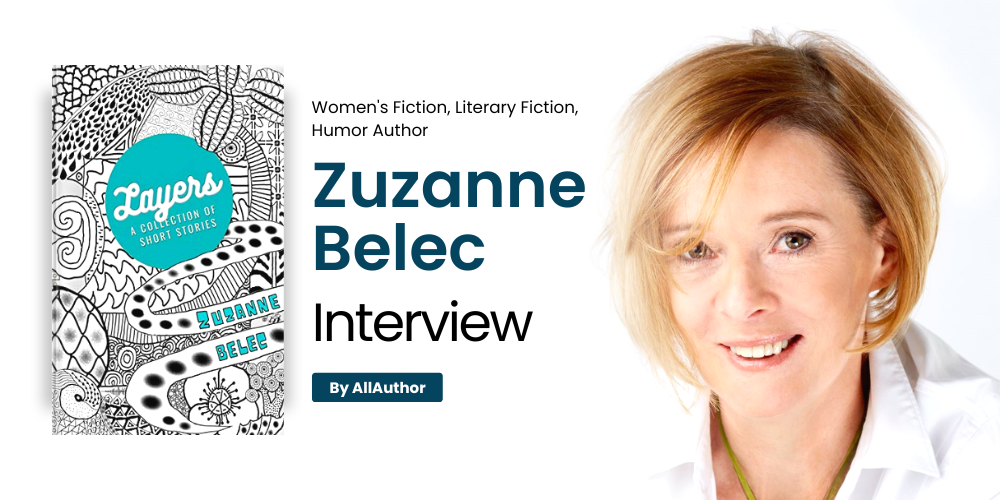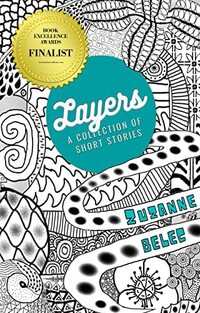Zuzanne Belec Interview Published on: 04, Jul 2022
 What kind of child would you say you were like?
What kind of child would you say you were like?
Always up climbing trees, digging tarantulas from their holes in the ground, watching wild animals while on safari with my folks. My friends and I would be out all day, going home only when our moms called in the evenings… So a free-spirit, tomboy type, I suppose. And a lucky one, for that matter.
Do you remember the first book you read?I don’t remember exactly which, but it was from the Ladybird Books for Children range. I loved those. They kept me engrossed for hours on end. Vintage now, I presume – the books, I mean.
As a teenager, what were you obsessed with?Horses. I had two horses and took showjumping quite seriously at one point. But then I discovered boys…
Which of your childhood dreams was the first to die?To become a figure-skating champion. In Africa. I know.
What inspired your first original story? Did you share the tale with anyone?A close shave with a charging elephant bull inspired my first original story. I didn’t really share it with anyone until I discovered I could actually write. Which was only recently.
Which story took the longest to write in the book, Layers: A Collection of Short Stories?It may sound weird that one of my shortest stories took me the longest, relatively speaking, but it is so – The Old Man and The Donkey. Maybe it’s because this story sprouted from one single image, nothing else. That of a donkey hobbling along an old, cobbled street, with the wine barrels on it’s back swishing side to side as the donkey shuffled along. And I had to build a whole story and world around that. It was challenging, and I loved every minute of it. Well, almost every minute.
When writing a story, do you prefer to base the plot and characters based on real-life facts or start from scratch?Basing the plot and characters on real-life facts or people is much easier for me than starting from scratch. But, coming to think of it, a few of my stories do have a completely imagined storyline or characters, for example The Arctic Haze. How I pulled those off I don’t know, but I think that what drives those stories for me is a strong image in my head, or a topic/cause that I’m concerned about and keen on sharing in my weird way.
We know that all of a writer's books are like their children, but if you had to choose, which one would you say is your favourite?That is hard, yes. Of all the stories I’ve written, I guess it would be Mothers. Because by writing this story, I was able to voice my concern for, and bring awareness to, a subject very dear to my heart: the plight of the African elephant. And I hope that I did raise at least some awareness of this subject through this anthropomorphic story. It is a sad story, and naturally some readers don’t like reading such sad work. But how else are we to show how urgent a cause is, than by revealing its reality?
What is your main objective when you write a book in terms of how you want the reader to feel?I’d like the reader to see, smell, touch, taste, hear and sense the scenes. To feel it down to their bones, and to come away thinking about the story or topic after they’ve closed the book.
Would you ever write or publish a book that you didn't feel emotionally connected to if you knew it would sell well?That’s a good question. I haven’t really given it much thought. Let me think… It is enticing, but no!
What's your writing schedule like? Describe the perfect setting for a good writing session.My husband built me the quaintest writing den (complete with heated floor), so whenever I can, I like to spend all day there writing, every day, except weekends (the house needs dusting too, unfortunately, and the family some TLC too). That’s my idea of a good writing day (uninterrupted, of course). But my general routine is this: after some morning exercises to stretch the bones, we have breakfast, and then I go to my den. There I write my Morning Pages and do some creative writing until about lunchtime. After lunch, it’s then down to some socializing, marketing and admin work in the afternoons.
What were some misconceptions you had about the book and publishing industry before you became a published author?Before we cover my misconceptions about the book and publishing industry, let me tell you about my biggest misconception about becoming an author in the first place: until a few years ago I’d spent my whole life thinking that writing a book was just for the gods! When I learnt from Stephen King that the average layperson can actually become a good author over time, through hard work and dedication, I was blown away and began learning all I could about the craft and industry. So when I jumped into it, I went in with my eyes more open this time. So no real misconceptions, as such. Just acceptances of the realities that it’s NOT easy.
What common writing advice do you disagree with?I can’t say I disagree with anything yet, because I’m still learning everything.
How many plot ideas are just waiting to be written? Can you tell us about one?I have a few dozen plot ideas in my Ideas Book, waiting for me to finally pay them some attention. One of my more recent ones ties in with my favourite topic of cultural challenges in today’s global world. When we were in Romania, we witnessed many interesting and colourful contrasts between tradition and modernity, and I’d like to build a story around these wonderful images and people I was lucky to witness and meet.
What do you think of AllAuthor? Has this website been helpful to you?AllAuthor has been very helpful for this me. I’ve met many wonderful folks on there, and I find that the AllAuthor promo tools and features are very effective (and consistent). The Premium subscription I’m on has paid off well for me and I will be subscribing again for it in the next oncoming period. I just wish I had a bit more time to learn and try out all the helpful functions AllAuthor offers…
Share Zuzanne Belec's interview
Author, translator, and poet, Zuzanne Belec grew up in Africa. Her debut collection, Layers, is the result of her passion for writing. Her stories are filled with originality, intrigue, suspense, and life. Her work, Layers is a collection of eight short stories on the power of the human spirit. She lives in the heart of Europe.


